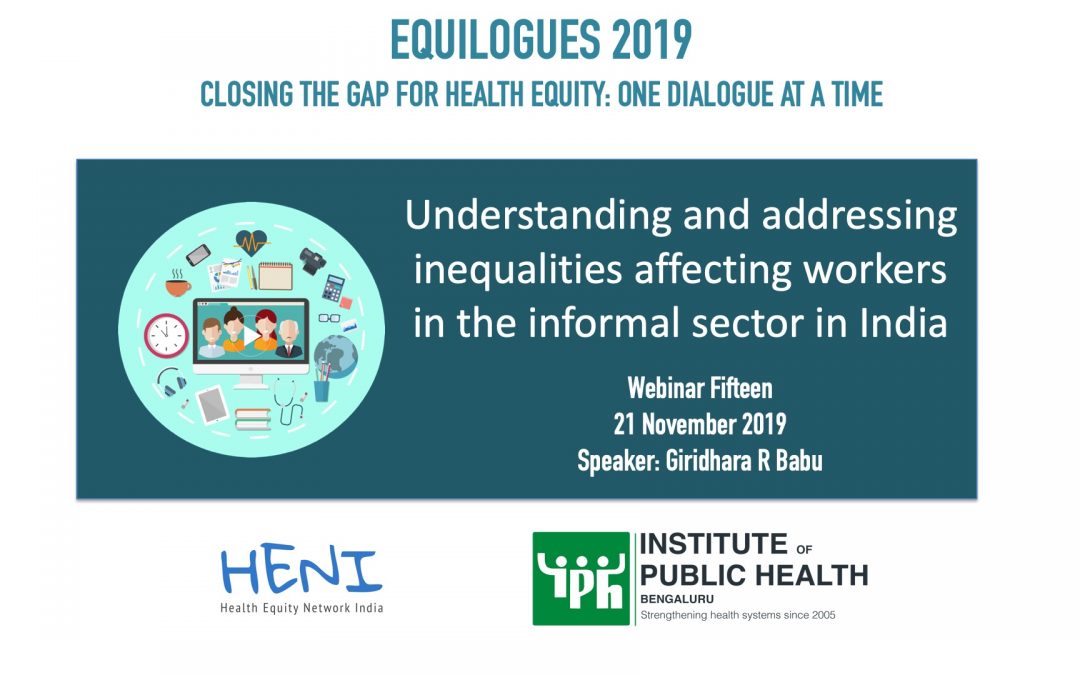
by Yogin V A | Oct 24, 2019 | Equilogues series, Recent updates
The Health Equity Network India (HENI) (with its secretariat at the Health Equity Cluster, IPH Bengaluru) is pleased to announce the fifteenth webinar in the Equilogues series in Nov 2019.
This webinar is based on the chapter ‘Understanding and addressing the inequalities affecting workers in the informal sector in India’ by Yamuna A and Giridhara R Babu (speaker) in the book ‘Health, Safety and Well-Being of Workers in the Informal Sector in India’.
The speaker, Giridhara R Babu, is a professor and head of the Life-course Epidemiology Unit at the Public Health Foundation of India. In this webinar, he will discuss the inequality faced by informal sector workers, the current situation in India and ways to address the inequities affecting workers in the informal sector.
by admin | Sep 19, 2019 | Equilogues series
Equilogues is a series of webinars organized by Achutha Menon Centre for Health Science Studies, Sree Chitra Tirunal Institute for Medical Science & Technology, Trivandrum, Kerala under the project, “Closing the Gap: Health Equity Research Initiative in India”, funded by IDRC, Canada.
The topic of the webinar is “Commercialization in the Health Sector in India: Implications for Inequities in Health”. Dr.Rama Baru is Professor at Centre for Social Medicine and Community Health at Jawaharlal Nehru University, New Delhi.
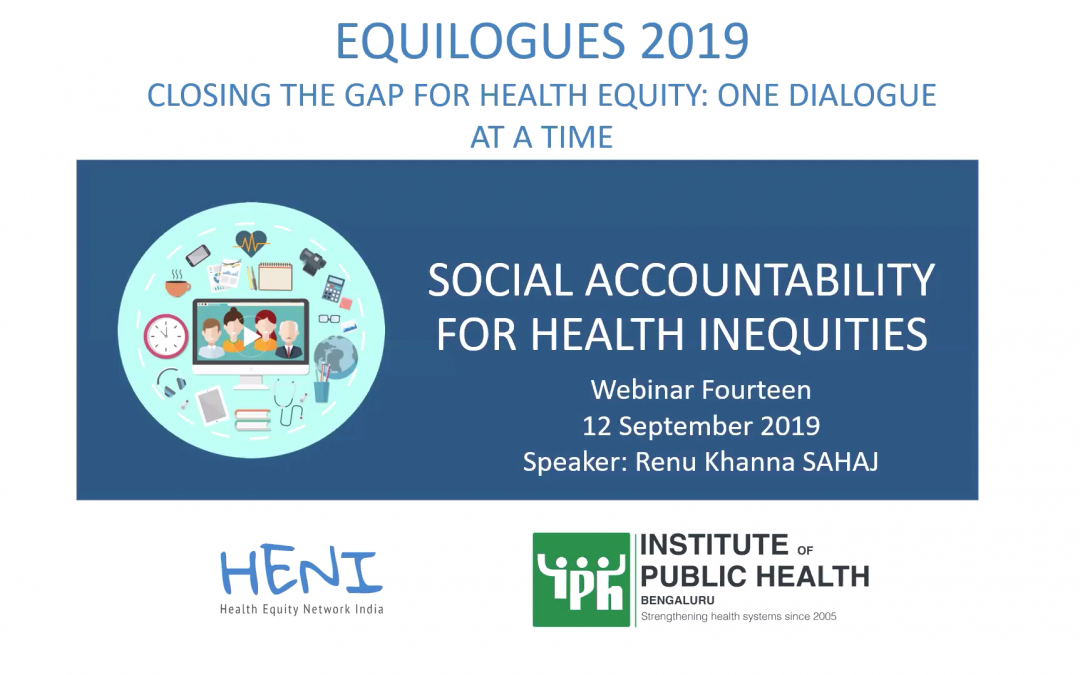
by admin | Sep 17, 2019 | Equilogues series, Recent updates
Summary of the talk: In this webinar, the speaker will introduce the concept of social accountability as understood and promoted by the Community of Practitioners on Accountability and Social Action in Health (COPASAH). Illustrations based on COPASAH members’ work will follow. Webinar participants will be invited to share their experiences, understanding and learnings from their social accountability efforts. The upcoming Global Symposium on Citizenship, Governance and Accountability in Health (October 2019) will be discussed in terms of objectives, expected outcomes and themes.
About the speaker: Renu Khanna, a women’s health and rights activist, has a Masters in Business Administration from Faculty of Management Studies, Delhi University, India. She is a co-founder of SAHAJ-Society for Health Alternatives, a reputed organisation based in Vadodara (Gujarat). Renu has worked in the area of health inequity for over three decades – first in tribal areas of Gujarat, the urban poor in Vadodara city and subsequently on health issues of sexual minorities, people living with disabilities, and adolescents. Renu has over four decades of experience as a trainer, action researcher, evaluator and policy analyst in India.
She is on the governing boards and steering committees of several national and international organisations and networks, including the Steering Committee of COPASAH. She is a Joint National Convenor of Jan Swasthya Abhiyan and a founder member of CommonHealth Coalition of Maternal Neonatal Health and Safe Abortion.
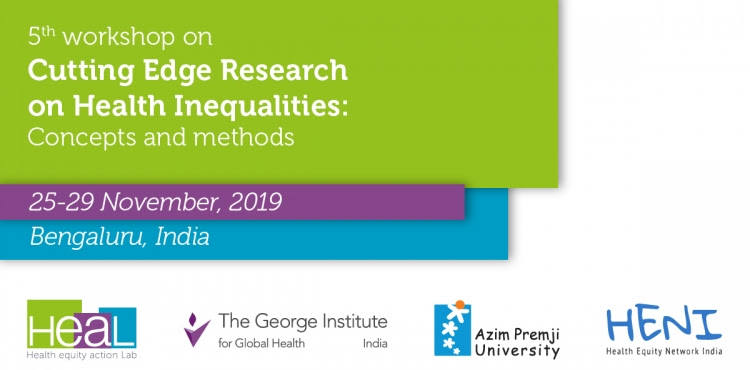
by admin | Aug 16, 2019 | Articles, Blog, Equilogues series, Recent updates
cutting edge research on health inequalities
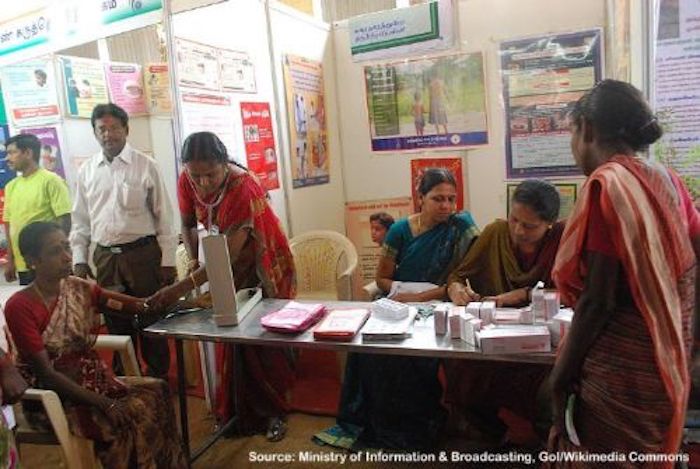
by admin | May 2, 2019 | Equilogues series, Recent updates
Rajalakshmi RamPrakash is a researcher and a social activist on gender and health-based out of Chennai. She has a Masters in Social Work and a Doctorate in Social Sciences from Tata Institute of Social Sciences. She has been involved in several research studies on themes intersecting gender with sexual and reproductive health, law, ethics, health insurance and health systems. She is a member of Jan Swasthya Abhiyan, Gender & Evaluation Community and is currently with Loyola Institute of Business Administration (LIBA), Chennai.
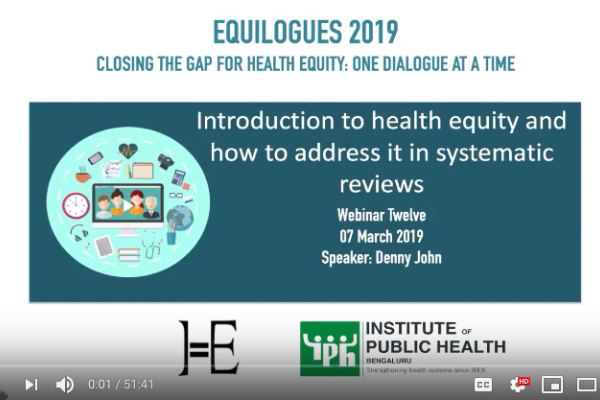
by admin | Mar 8, 2019 | Articles, Equilogues series, Recent updates
Introduction to health equity and how to address it in systematic reviews. The webinar will provide concepts of health equity, and its relation to social determinants of health. The need to look at health inequity beyond a ‘Rich-Poor’ Gap, using PROGRESS-Plus dimensions in systematic reviews, will be discussed. The concepts of using equity in knowledge translation efforts such as evidence summary and policy briefs will also be explained.




